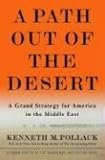If you read a lot of book reviews, as I do, you will have noticed that many reviewers (especially ones who are also writers or work in the same field as the author of the book) are reticent to go on attack mode when reviewing a peer’s work. Add to that the phenomenon of
— trading favorable coverage in the expectation that the kind treatment will be returned — and many reviews only seem to tepidly explore the flaws of the work of the work under review.
Pollack commits errors that, despite his years in the corridors of power and some 70 pages of footnotes, betray a lack of genuine intimacy with his subject. It is not true, as he asserts, that education in the Persian Gulf emirates is largely private. Nor is it true, any longer, that virtually the only foreign investment in Arab countries goes toward pumping more oil: real estate, tourism, banking, telecoms and even heavy industry now lure investors, too.
It is an outdated generalization to state that “Arab bureaucracies . . . create interminable delays with customs regulations, inspections and other red tape.” Try telling that to Dubai Ports World, a company that runs 45 container terminals in 29 countries, or to the operators of the giant, state-of-the-art transshipment hubs in Egypt and Morocco that are set to dominate Mediterranean trade. It is even more misleading to assert that “the Arab regimes have implicitly or explicitly backed a range of terrorist groups.” Pray, which Arab governments does he mean, and which groups is he talking about?
Pollack also shows a shaky grasp of history. We know that the Ottoman Empire declined and fell, but to have endured for five centuries, and for half those as the biggest state in Europe, the Mediterranean and the Middle East, does not make the Ottomans “unsuccessful.” Elsewhere he tells us sagely that “over time, the stagnation of the Arab economies has created considerable poverty,” as if there were no poor Arabs before, and as if one of the most startling modern examples of mass impoverishment was not the Clinton-era sanctions on Iraq, which destroyed its middle class and set the stage for postwar chaos.
America gets off rather lightly in gen eral, in Pollack’s account, compared with the sad Arabs whom we must help to be like us. We are told, for instance, that the United States only grudgingly became involved in the grisly Iran-Iraq war of the 1980s when it nobly undertook to reflag oil tankers in order to protect the flow of oil. No mention here of Donald Rumsfeld’s back-slapping with Saddam Hussein or the supply of satellite intelligence to him or the exchange of American weapons to Iran for hostages — all of which helped prolong the slaughter.
Pollack seems oddly unaware of history’s motivating forces. To assert that “what triggers revolutions, civil wars and other internal unrest is psychological factors, particularly feelings of extreme despair,” is plain silly. The Boston Tea Party could not have been prevented by Prozac. Similarly, he ascribes feelings to broad categories of Middle Easterners, devoid of any context or explanation. They are “angry populations” who suffer “inchoate frustration” and “a pathological hatred of the status quo.” We repeatedly hear of “Arab rage at Israel” and “Arab venom for Israel.” Nowhere is there a hint that such attitudes might bear some relation to the plight of the Palestinians, the agony of military defeat or the humiliation of life under Israeli occupation.
In fact, the book’s most salient distortions stem from Pollack’s protectiveness toward Israel. He makes some absurdly cockeyed assertions, like, “America’s support for Israel over the years has even been a critical element in winning and securing Arab allies.” He offers misleading false alternatives, declaring, for instance, that there is “absolutely no reason to believe that ending American support for Israel would somehow eliminate” the risk of Islamist zealots taking power and cutting oil exports. How about making aid to Israel, and not just to Arabs, conditional, or aiming at mitigating, rather than eliminating, such risks? Pollack makes a peculiarly acrobatic effort to prove that hostility to Israel is not a prime motivating factor behind militant jihadism, repeating this assertion no fewer than four times in two paragraphs. Has he not bothered to listen to Osama bin Laden’s addresses to the American people, where he said that what converted him from dreamer to murderous activist was Israeli bombs falling on Beirut in 1982?
Although I’ve only looked at this book briefly, from the little I saw it’s a well deserved put-down of the man who, with “Threatening Storm,” contributed significantly to the war-drums on the eve of the invasion of Iraq. Well-deserved.
